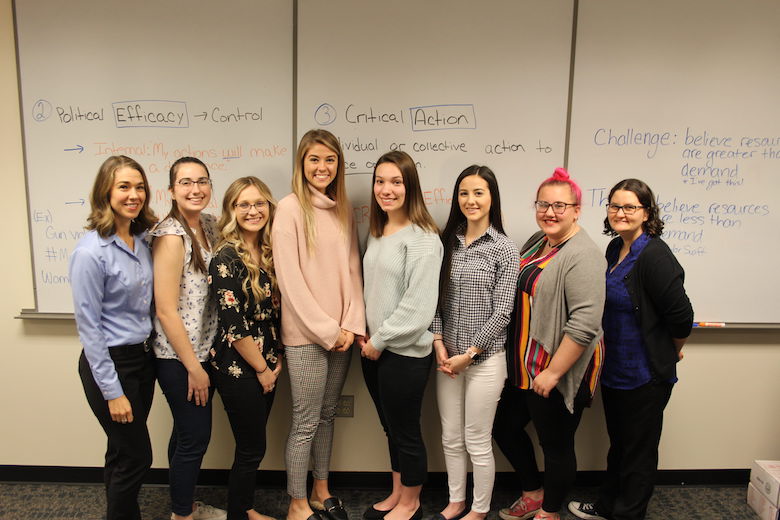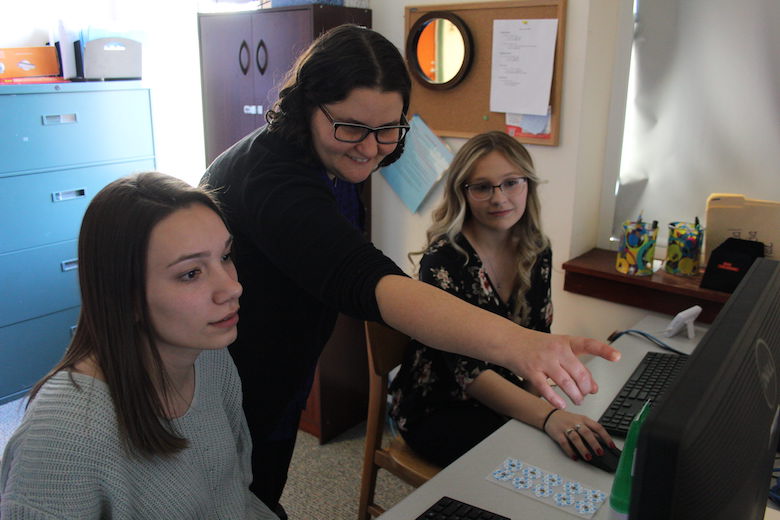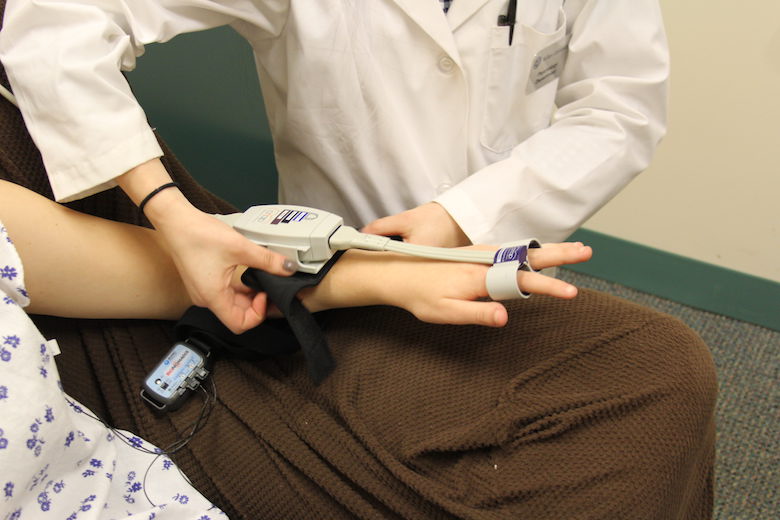What’s it like working in a psychology research lab? News@Wilkes shadowed associate professors of psychology Ellen Newell and Jennifer Thomas and their team of students for the “In the Lab” feature.
On the third floor of Breiseth Hall, student researchers gather in the psychology research center, each assigned a task. These students are participating in the Behavioral, Activism, Developmental and Social Stress Lab with associate professors of psychology Ellen Newell and Jennifer Thomas. The lab is an interdisciplinary one giving the student research assistants an opportunity to work with Newell, a social psychologist who studies how people react in social situations, and Thomas, a developmental psychologist who also runs Wilkes’ women’s and gender studies program.
The team is continuing research that has been ongoing for the last four years. They take participants and put them in a stressful social interaction where they experience common forms of prejudice or discrimination. Then, they ultimately identify which types of participants’ individual differences will determine whether a person views this stressful situation as a challenge to be overcome or as a threat that they cannot deal with.
“If we can identify those personality factors, then we can empower people to manage these threatening situations in a more adaptive way that will be better for their health in the short and long-term” Thomas explains.
Newell explains that participants do not know the purpose of the study and are given a cover story about what is being assessed. People in the study are given a task to perform in a situation that is being evaluated – such as answering questions in a job interview.
“Then we’re looking for coping strategies,” Newell says. “When anyone performs these tasks we would expect things like their heart rate will go up and among a lot of people their physiological functioning will be pretty adaptive. We call this a “challenge response” and it’s kind of like the fight response in the fight or flight effect.
Study participants, however, who don’t have good coping strategies may exhibit “threat response” that is reflected in specific physiological reactions and is a sign of poor coping in stressful situations.
So far, the team has conducted the experiment with 142 participants. They hope to reach 160 participants in total. Most participants are students enrolled in the introductory psychology course, Psychology 101. At the start of the semester, surveys to assess personality traits and attitudes are completed by students enrolled in all sections of Psychology 101. Because this is a blind study, the data from those surveys will not be merged with the participants’ data until the study is completed.
Newell and Thomas’s student research assistants are hand selected and invited to apply to be research assistants by Newell and Thomas. After applying, students are interviewed by the faculty members. “The research is sensitive, so we need to be sure our students are mature enough to handle the responsibility,” Thomas explains.
If accepted, the students are then enrolled in the two-semester research lab that is part of an upper-level independent research experience in psychology. The course includes a classroom component as well as the work in the lab. Usually they work with Thomas to learn about social issues and with Newell to learn about the biological and physiological components. Students find that the opportunity to assist with research enhances their educational experience.
“I feel like this lab has provided me with a lot of opportunities that students that are not in this lab will not receive,” explains lab assistant and Wilkes junior Taylor Barletta. “I plan to go to grad school so I know this will help with research that a lot of others won’t get before then.”

In addition to Barletta, other members of the 2019-2020 research team include senior Logan Biechy, juniors Monica Morrison and Jay Guziewicz and sophomore Amaris Ward, all psychology majors. Other team members include Keira D’Agostino,a psychology and criminology dual major, and junior Janelle Sherman who has a dual major in nursing and psychology.
What is a typical day in the Behavioral, Activism, Developmental and Social Stress lab?
A day in the lab has a set routine and an exact format for students on the research team. There are five people in the lab during every session. This includes Newell or Thomas, one student researcher called the experimenter who works one-on-one with the participant, two research assistants working audio and coding physiological data on the computers, and the participant. The experimenter is the only one in direct contact with the participant and needs to be skilled at putting that person at ease. The research assistants sit in a separate room, observing through one-way glass.
“It’s like a play,” Newell says. “And everyone has their role.”
When the study begins, the experimenter gets the participant from waiting room. The participant fills out an informed consent prior to entering the actual testing facility. Once inside, the experimenter hooks the participant up to an electrocardiogram or EKG machine using sensors that are adhered to the body to measure heart rate. The participant also is hooked up to a blood pressure monitor. Other sensors monitor blood flow. At this point, the experimenter steps aside. The participant will then be cued by the student researcher manning the audio on what tasks to perform.

During the study, the team is assessing physiological indicators that reflect stress levels in the study’s participants. By monitoring the participant’s physiological levels, the team is able to see how blood moves through their body as an indicator of stress. For example, if the blood moves all over the body they are often in challenge mode. They have recognized that the situation is stressful, but also that they can handle the stressor in a healthy way. However, when the blood is stuck in the core of the body—they are in “threat mode” and might freeze up and do nothing to help overcome the stress of experiencing discrimination. This response is much unhealthier in the long run.
A lab assistant records the specific physiological data. Once the study is complete, the experimenter returns, debriefs the participant and explains that the actual purpose of the study must remain private in order to avoid prejudicing future study participants. After the participant leaves, the team prepares for another participant.
Tools of the trade
The following equipment is used in the research lab:

- Three Computers; one for audio, one to record physio data and one for the actual participant
- Blood pressure monitor
- Electrocardiogram
- Impedance Cardiography: Noninvasive technology that converts changes in thoracic (part of the body of a mammal between the neck and the abdomen) electrical changes in blood volume over time
How many days and hours are spent in the lab?
The team spends a minimum nine hours a week in the lab, conducting studies three days a week. Each study takes one hour and 15 minutes to complete, allowing for about five studies a day.
How is this preparing students for the future?
With an emphasis on real-world application, this research is setting student researchers up for success. “We take the students to conferences and they get to present the research,” explains Newell. Currently, it’s the season to submit proposals to present at conferences, so the team is collecting their data to present.
Senior Keira D’Agostino has worked in the research lab for two and a half years. She already has had an opportunity present research at The Society for Research on Child Development, The Scholarship Symposium at Wilkes University and also will present at the American Psychological Association convention this summer.
“I never had an opportunity to present to a large audience in that capacity,” says D’Agostino who is an advanced research assistant. “It gave me a lot of experience. I’m also looking into grad school so it’s helping with the application process. I think I’m a lot more prepared. I never knew all of the biology elements, like blood pressure. As a psychology major, I never thought I’d do that, so it’s been interesting to tie it all together.”






